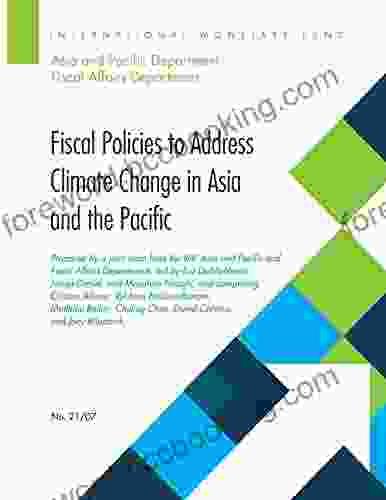Fiscal Policies to Address Climate Change in Asia and the Pacific: A Departmental Perspective

Climate change is one of the most pressing challenges facing our planet today. The Asia-Pacific region is particularly vulnerable to the impacts of climate change, as it is home to some of the world's most populous and fastest-growing economies.
5 out of 5
| Language | : | English |
| File size | : | 4665 KB |
| Text-to-Speech | : | Enabled |
| Screen Reader | : | Supported |
| Enhanced typesetting | : | Enabled |
| Word Wise | : | Enabled |
| Print length | : | 146 pages |
Fiscal policies can play a significant role in addressing climate change. By using fiscal instruments to incentivize or discourage certain activities, governments can help to reduce greenhouse gas emissions, promote energy efficiency, and support the development of renewable energy sources.
This book provides a comprehensive overview of the fiscal policies that can be used to address climate change in Asia and the Pacific. It discusses the challenges and opportunities of using fiscal policies to mitigate climate change, adapt to its impacts, and promote sustainable development.
Chapter 1: The Challenges of Climate Change in Asia and the Pacific
The first chapter of this book outlines the challenges that climate change poses to the Asia-Pacific region. These challenges include:
* Sea level rise, which threatens to displace millions of people and damage coastal infrastructure. * More frequent and intense extreme weather events, such as typhoons, floods, and droughts. * Changes in agricultural productivity, which could lead to food shortages and price increases. * Increased health risks, such as heat-related illnesses and respiratory problems.
Chapter 2: The Role of Fiscal Policy in Addressing Climate Change
The second chapter of this book discusses the role that fiscal policy can play in addressing climate change. Fiscal policies can be used to:
* Mitigate climate change by reducing greenhouse gas emissions. * Adapt to the impacts of climate change by investing in infrastructure and services that can withstand extreme weather events. * Promote sustainable development by supporting the development of renewable energy sources and energy-efficient technologies.
Chapter 3: Fiscal Policies for Mitigating Climate Change
The third chapter of this book provides an overview of the fiscal policies that can be used to mitigate climate change. These policies include:
* Carbon taxes, which place a price on carbon emissions. * Cap-and-trade systems, which limit the total amount of greenhouse gases that can be emitted. * Subsidies for renewable energy and energy efficiency. * Green investment tax credits, which provide tax breaks for investments in clean energy technologies.
Chapter 4: Fiscal Policies for Adapting to Climate Change
The fourth chapter of this book provides an overview of the fiscal policies that can be used to adapt to the impacts of climate change. These policies include:
* Investing in infrastructure that can withstand extreme weather events, such as seawalls, flood control systems, and drought-resistant crops. * Providing financial assistance to communities that are affected by climate change. * Developing early warning systems to help communities prepare for extreme weather events. * Supporting research on climate change adaptation.
Chapter 5: Fiscal Policies for Promoting Sustainable Development
The fifth chapter of this book discusses the role that fiscal policy can play in promoting sustainable development. Sustainable development is a development path that meets the needs of the present without compromising the ability of future generations to meet their own needs.
Fiscal policies can promote sustainable development by:
* Investing in education, health care, and other social services. * Supporting the development of sustainable agriculture practices. * Promoting the use of renewable energy and energy-efficient technologies. * Encouraging responsible consumption and production patterns.
This book provides a comprehensive overview of the fiscal policies that can be used to address climate change in Asia and the Pacific. It discusses the challenges and opportunities of using fiscal policies to mitigate climate change, adapt to its impacts, and promote sustainable development.
The book is a valuable resource for policymakers, researchers, and anyone else who is interested in learning more about the role of fiscal policy in addressing climate change.
5 out of 5
| Language | : | English |
| File size | : | 4665 KB |
| Text-to-Speech | : | Enabled |
| Screen Reader | : | Supported |
| Enhanced typesetting | : | Enabled |
| Word Wise | : | Enabled |
| Print length | : | 146 pages |
Do you want to contribute by writing guest posts on this blog?
Please contact us and send us a resume of previous articles that you have written.
 Book
Book Novel
Novel Page
Page Chapter
Chapter Text
Text Story
Story Genre
Genre Reader
Reader Library
Library Paperback
Paperback E-book
E-book Magazine
Magazine Newspaper
Newspaper Paragraph
Paragraph Sentence
Sentence Bookmark
Bookmark Shelf
Shelf Glossary
Glossary Bibliography
Bibliography Foreword
Foreword Preface
Preface Synopsis
Synopsis Annotation
Annotation Footnote
Footnote Manuscript
Manuscript Scroll
Scroll Codex
Codex Tome
Tome Bestseller
Bestseller Classics
Classics Library card
Library card Narrative
Narrative Biography
Biography Autobiography
Autobiography Memoir
Memoir Reference
Reference Encyclopedia
Encyclopedia Priska Poirier
Priska Poirier Herbert Spencer
Herbert Spencer Hicham And Mohamed Ibnalkadi
Hicham And Mohamed Ibnalkadi Hemanta Sundaray
Hemanta Sundaray Pippa Pennington
Pippa Pennington Howard Maxwell
Howard Maxwell Henry Kisor
Henry Kisor Philip Garrison
Philip Garrison Lindsay Derollo
Lindsay Derollo Richard Ferber
Richard Ferber Henry Lewis Suggs
Henry Lewis Suggs Hayley Osborn
Hayley Osborn Luke Gilkerson
Luke Gilkerson Heather Chase
Heather Chase Hillary Kerr
Hillary Kerr Hollis Lance Liebman
Hollis Lance Liebman J Peter Steidlmayer
J Peter Steidlmayer John Tomasi
John Tomasi Hitomi Shida
Hitomi Shida T M Haviland
T M Haviland
Light bulbAdvertise smarter! Our strategic ad space ensures maximum exposure. Reserve your spot today!
 Damon HayesFollow ·10.3k
Damon HayesFollow ·10.3k Jace MitchellFollow ·16.4k
Jace MitchellFollow ·16.4k Emmett MitchellFollow ·17.6k
Emmett MitchellFollow ·17.6k Timothy WardFollow ·13.5k
Timothy WardFollow ·13.5k Caleb LongFollow ·17.8k
Caleb LongFollow ·17.8k Jeffrey HayesFollow ·17.7k
Jeffrey HayesFollow ·17.7k Jared PowellFollow ·4.9k
Jared PowellFollow ·4.9k Colt SimmonsFollow ·18.5k
Colt SimmonsFollow ·18.5k

 Fabian Mitchell
Fabian MitchellUnleash the Adventure: Family Fun in the Black Hills
Nestled amidst the rolling hills...

 Alfred Ross
Alfred RossUnleashing Peak Business Performance: A Journey of...
In today's rapidly evolving business...

 Fernando Bell
Fernando BellEmbrace the Prophetic Voice of Howard Zinn: A Journey...
As we navigate the complexities of our...

 Jonathan Franzen
Jonathan FranzenChildren of the Arctic: A Literary Expedition to the...
In the annals of...

 Branson Carter
Branson CarterYou Can Be Neutral on a Moving Train: A Transformative...
Welcome, dear reader,...
5 out of 5
| Language | : | English |
| File size | : | 4665 KB |
| Text-to-Speech | : | Enabled |
| Screen Reader | : | Supported |
| Enhanced typesetting | : | Enabled |
| Word Wise | : | Enabled |
| Print length | : | 146 pages |














